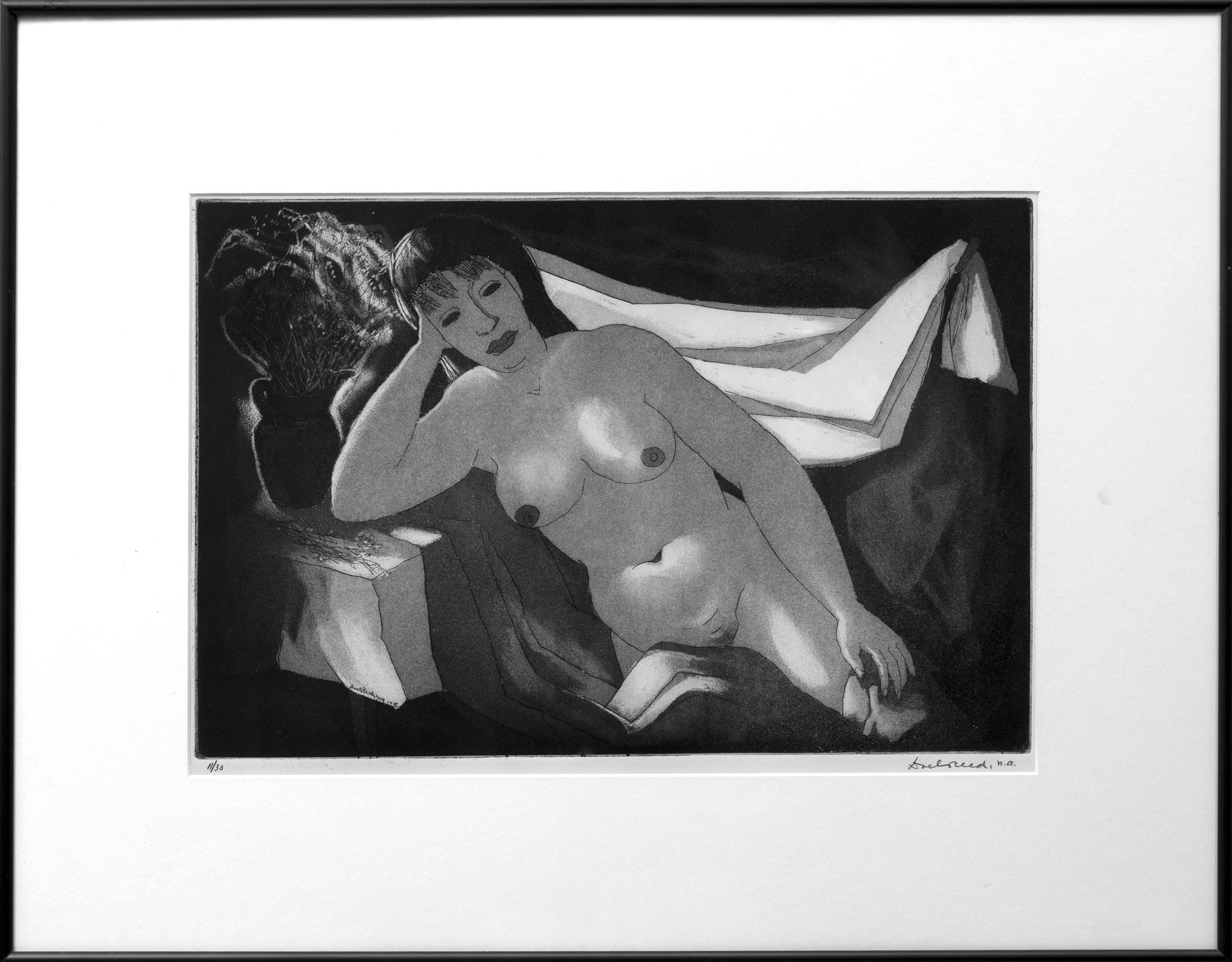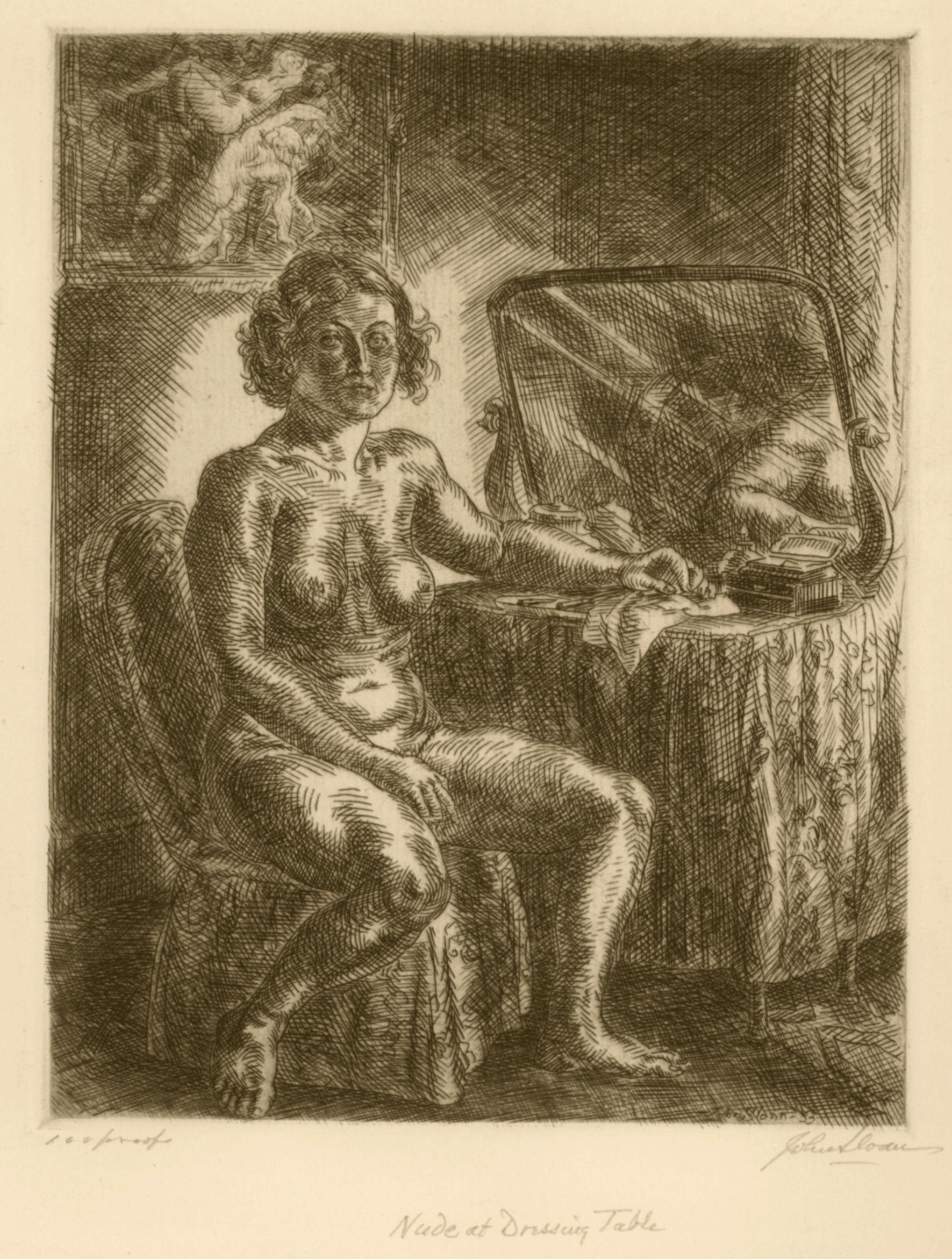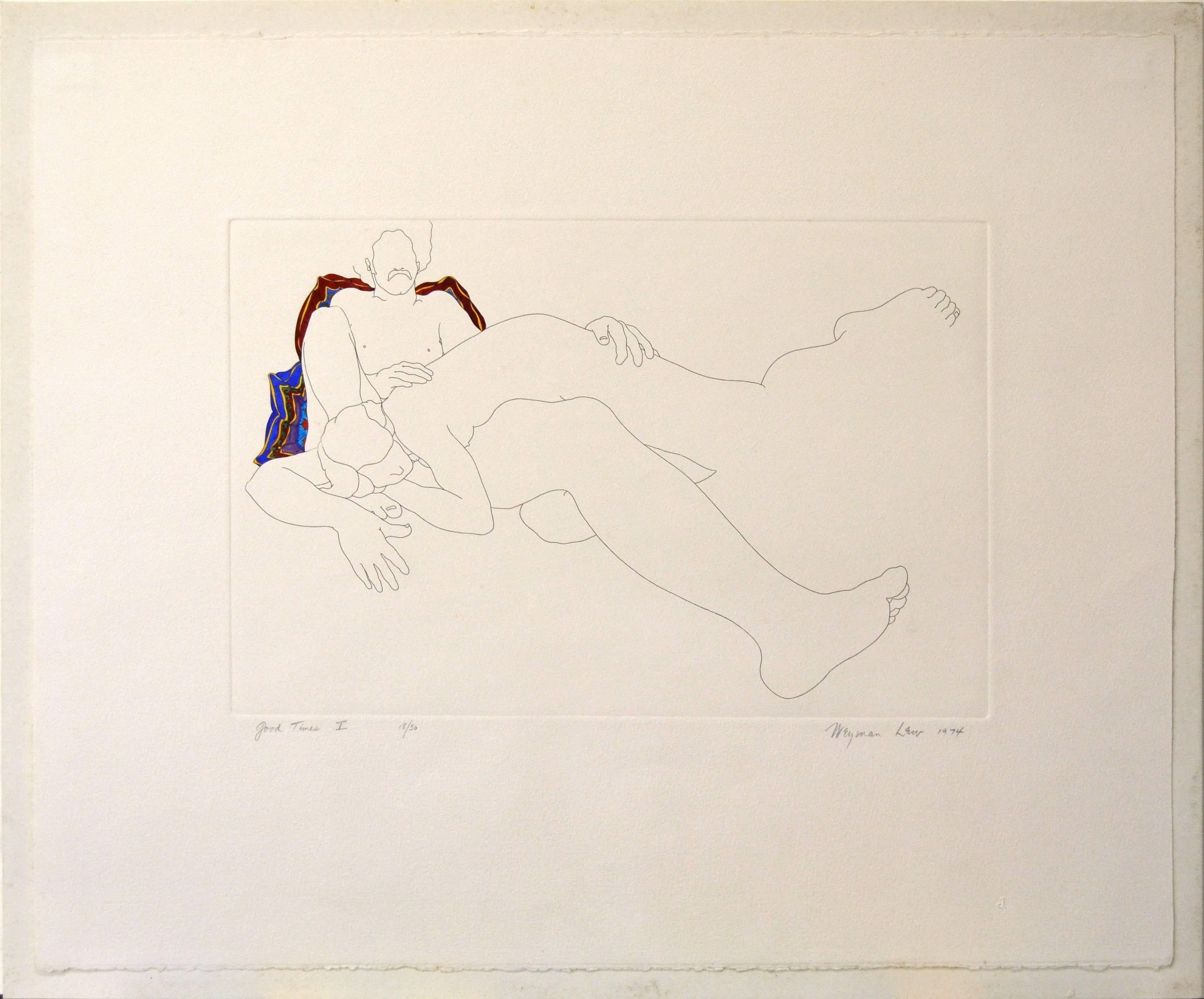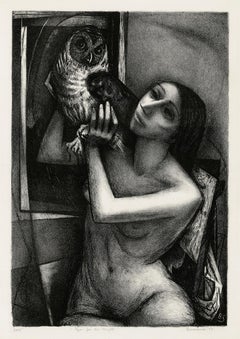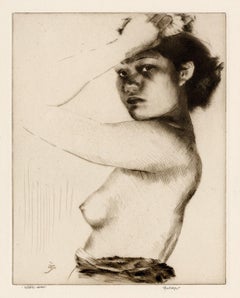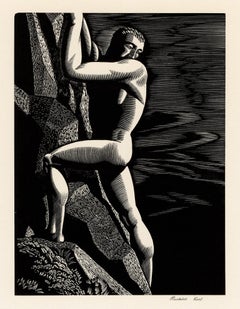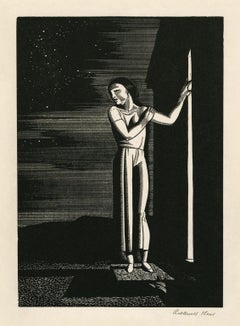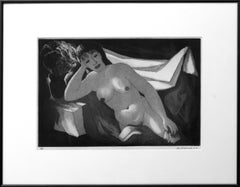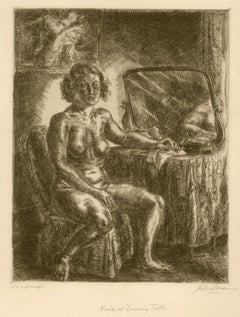Items Similar to Modernist Nude — Atelier 17
Want more images or videos?
Request additional images or videos from the seller
1 of 3
Russell T. LimbachModernist Nude — Atelier 17c. 1930
c. 1930
About the Item
Russell T. Limbach, 'Untitled (Modernist Nude)', etching and aquatint, no known edition, c. 1930. Signed in pencil. A fine impression, on cream wove paper, with full margins (1 7/8 to 2 3/4 inches), in excellent condition. Image size 8 15/16 x 5 15/16 inches; sheet size 13 3/8 x 10 1/4 inches. Extremely rare. Matted to museum standards, unframed.
Probably created when Limbach was in Paris (1928-1934), where he was exposed to modernist printmaking explorations at Stanley William Hayter’s 'Atelier 17'.
ABOUT THE ARTIST
Born in Massillon, Ohio, Russell Limbach (1904-1971) was a graphic artist, painter, cartoonist, illustrator, and teacher. He briefly attended the Cleveland School of Art, then became an apprentice in a local lithographic plant. He realized the artistic potential of printmaking at a local exhibit when he saw James McNeill Whistler’s etchings for the first time. He left for Europe in 1928 and studied for nearly a year under fourth-generation master lithographer Edmond Desjobert in Paris. Returning to Cleveland in the depths of the depression, he traveled to New York City, where he found work as the Art Editor of The New Masses. Subsequently, he was employed by the New York City WPA (part of the Depression-era New Deal) as a technical expert on color lithography and helped to organize the Graphics Division of the WPA Arts Project in New York.
In addition to printmaking and painting, Limbach was an accomplished political cartoonist and illustrator for leading leftist publications such as the New Masses and the Daily Worker. He also wrote and illustrated two books: American Trees, 1942; and But Once a Year, 1941.
In 1941 Limbach was hired by Wesleyan University with the mandate of adding practical, hands-on experience in making art to the theoretical study of its expressive form. He established the 'Art Laboratory', which became an important addition to the university's newly conceived 'Humanities Workshops'. A teacher who was beloved by his students, Limbach's 'Art Lab' flourished into the 1950s and 60s.
Limbach’s work was exhibited widely, receiving numerous awards: Cleveland Museum of Art, 1926-1929 (prizes), 1931 (prize), 1934 (prize), 1935 (prize); Philadelphia Printmakers 1928 (medal); California Printmakers, 1928 (medal); Art Institute of Chicago (1931); and The Library of Congress, 1946 (prize).
His work is in the collections of Cleveland Museum of Art, Art Institute of Chicago, Brooklyn Museum, Davidson Art Center (Wesleyan College), Metropolitan Museum of Art, New York Public Library, Whitney Museum of American Art, Library of Congress, Yale University, Wesleyan University, San Francisco Museum of Art, Herron Art Institute, Glasgow University, Lyman Allyn Museum, Hunter College, University of Wisconsin, and Los Angeles County Museum of Art.
- Creator:Russell T. Limbach (1904 - 1971)
- Creation Year:c. 1930
- Dimensions:Height: 9.88 in (25.1 cm)Width: 14.25 in (36.2 cm)
- Medium:
- Movement & Style:
- Period:
- Condition:
- Gallery Location:Myrtle Beach, SC
- Reference Number:Seller: 1036941stDibs: LU53236676012
About the Seller
5.0
Recognized Seller
These prestigious sellers are industry leaders and represent the highest echelon for item quality and design.
Platinum Seller
Premium sellers with a 4.7+ rating and 24-hour response times
Established in 1995
1stDibs seller since 2016
297 sales on 1stDibs
Typical response time: 1 hour
Associations
International Fine Print Dealers Association
- ShippingRetrieving quote...Shipping from: Myrtle Beach, SC
- Return Policy
Authenticity Guarantee
In the unlikely event there’s an issue with an item’s authenticity, contact us within 1 year for a full refund. DetailsMoney-Back Guarantee
If your item is not as described, is damaged in transit, or does not arrive, contact us within 7 days for a full refund. Details24-Hour Cancellation
You have a 24-hour grace period in which to reconsider your purchase, with no questions asked.Vetted Professional Sellers
Our world-class sellers must adhere to strict standards for service and quality, maintaining the integrity of our listings.Price-Match Guarantee
If you find that a seller listed the same item for a lower price elsewhere, we’ll match it.Trusted Global Delivery
Our best-in-class carrier network provides specialized shipping options worldwide, including custom delivery.More From This Seller
View All'Eyes for the Night' — Mid-century Surrealism
By Benton Murdoch Spruance
Located in Myrtle Beach, SC
Benton Spruance, 'Eyes for the Night', lithograph, 1947, edition 35, Fine and Looney 260. Signed, dated, titled, and annotated 'Ed 35' in pencil. A fine impression, on heavy, cream ...
Category
1940s American Modern Figurative Prints
Materials
Lithograph
$720 Sale Price
20% Off
Kanani (Hawaii)— 1940s Polynesian Portrait
By John Melville Kelly 1
Located in Myrtle Beach, SC
John Melville Kelly, 'Kanani (Hawaii)', drypoint, 1946. Signed, titled and annotated 'No 36' in pencil. A superb impression, in dark brown ink, on ...
Category
1940s American Modern Nude Prints
Materials
Drypoint
'Mountain Climber' — American Modernism
By Rockwell Kent
Located in Myrtle Beach, SC
Rockwell Kent, 'Mountain Climber', wood engraving, 1933, edition 250, Burne Jones 93. Signed in pencil. A brilliant, black impression, on cream, wove Japan paper; the full sheet with margins (2 9/16 to 3 5/8 inches); slight skinning at the top sheet edge verso, where previously hinged; otherwise, in excellent condition. Archivally matted to museum standards, unframed.
Image size 7 7/8 x 5 7/8 inches (200 x 149 mm); sheet size 14 x 11 1/8 inches (356 x 283 mm).
Printed by Pynson Printers, New York. Distributed by The Print Club of Cleveland, Publication No. 11, 1933.
Literature: 'Rockwellkentiana,' Harcourt, Brace and Company, New York, 1933. '101 of The World’s Greatest Books', edited by Spencer Armstrong, 1950.
Impressions of this work are held in the following museum collections: Akron Art Institute, Burne Jones Collection, IL; Cincinnati Art Museum; Cleveland Museum of Art; Columbus Gallery of Fine Arts; Crystal Bridges Museum of American Art; Davis Museum at Wellesley College; Fine Art Museums of San Francisco; H. M. de Young Museum; Hermitage Museum; Kent Collection, NY; Library of Congress; Memorial Art Gallery, University of Rochester; Metropolitan Museum of Art; New York Public Library; Philadelphia Museum of Art; Princeton University Library; Smithsonian American Art Museum, Spector Collection, NY; SUNY, Plattsburg.
ABOUT THE ARTIST
Rockwell Kent (1882-1971), though best known as a painter, graphic artist, and illustrator, pursued many careers throughout his life, including architect, carpenter, explorer, writer, dairy farmer, and political activist. Born in Tarrytown, New York, Kent was interested in art from a young age. These ambitions were encouraged by his aunt Jo Holgate, an accomplished ceramicist. Jo came to live with the family after Kent’s father passed away in 1887 and took him to Europe as a teenager, undoubtedly kindling his interest in exploring the world.
Kent attended the Horace Mann School in New York City, where he excelled at mechanical drawing. His family’s financial circumstances prevented him from pursuing a career in the fine arts; however, after graduating from Horace Mann in 1900, Kent decided to study architecture at Columbia University.
Before matriculating at Columbia, Kent spent the first of three consecutive summers studying painting at William Merritt Chase’s art school in Shinnecock Hills, Long Island. There he found a community of mentors and fellow students who encouraged him to pursue his interest in art. At the end of Kent’s third summer at Shinnecock, Chase offered him a full scholarship to the New York School of Art, where he was a teacher. Kent began taking night classes at the art school in addition to his architecture studies but soon left Columbia to study painting full-time. In addition to Chase, Kent took classes with Robert Henri and Kenneth Hayes Miller, where his classmates included the artists George Bellows and Edward Hopper.
Kent spent the summer of 1903 assisting the eccentric painter Abbott Handerson Thayer at his studio in Dublin, New Hampshire—a position he secured through the recommendation of his Aunt Jo. Thayer’s naturalist lifestyle and almost mystical appreciation for natural phenomena greatly influenced Kent; he returned to Dublin for many years to visit Thayer and his family. Thayer gave the young artist time to pursue his work, and that summer Kent painted several views of the New Hampshire landscape, including Mount Monadnock. In 1905 Kent moved from New York to Monhegan Island in Maine, home to a summer art colony, where he continued to find inspiration in nature. Kent soon found success exhibiting and selling his paintings in New York, and in 1907, he was given his first solo show at Claussen Galleries. The following year he married his first wife, Kathleen Whiting (Thayer’s niece), with whom he had five children. The couple divorced in 1924, and Kent married Frances Lee the following year. They divorced after 15 years of marriage, and the artist married Sally Johnstone.
For the next several decades, Kent lived a peripatetic lifestyle, settling in several locations in Connecticut, Maine, and New York. During this time he took several extended voyages to remote, often ice-filled, corners of the globe, including Newfoundland, Alaska, Tierra del Fuego, and Greenland, to which he made three separate trips. For Kent, exploration and artistic production were twinned endeavors, and his travels to these rugged, elemental locations inspired his visual art and his writings. He developed a stark, realist landscape style in his paintings and drawings that revealed both nature’s harshness and its sublimity. Kent’s human figures, which appear sparingly in his work, often allude to the mythic themes of isolation, individualism, heroism, and the quest for self-connection. Important exhibitions of works from these travels include the Knoedler Gallery’s shows in 1919 and 1920, featuring Kent’s Alaska drawings...
Category
1930s American Modern Nude Prints
Materials
Woodcut
'Starry Night' — 1930s American Modernism
By Rockwell Kent
Located in Myrtle Beach, SC
Rockwell Kent, 'Starry Night' wood engraving, 1933, edition 1750, Burne Jones 103. Signed in pencil. A brilliant, black impression, on cream wove Japan paper; with margins (7/8 to 1 ...
Category
1930s American Modern Nude Prints
Materials
Woodcut
Madman's Drum (Brothel) — 'Story Without Words' Graphic Modernism
By Lynd Ward
Located in Myrtle Beach, SC
Lynd Ward, 'Madman's Drum, Plate 41', wood engraving, 1930, edition small. Signed in pencil. A fine, richly-inked impression, on off-white tissue-thin Japan paper; the full sheet with margins (1 5/8 to 2 1/2 inches); a small paper blemish in the upper right margin, away from the image, otherwise in excellent condition. A scarce, artist-printed, hand-signed proof impression before the published edition. Matted to museum standards, unframed.
Image size 5 1/2 x 3 3/4 inches (140 x 95 mm); sheet size 9 5/8 x 7 1/8 inches (244 x 181 mm).
From Lynd Ward’s book of illustrations without words, 'Madman’s Drum', Jonathan Cape and Harrison Smith, New York, 1930.
Reproduced in 'Storyteller Without Words, the Wood Engravings of Lynd Ward', Harry N. Abrams, New York, 1974.
ABOUT THE ARTIST
Lynd Ward is acknowledged as one of America’s foremost wood engravers and book illustrators of the first half of the twentieth century. His innovative use of narrative printmaking as a stand-alone storytelling vehicle was uniquely successful in reaching a broad audience. The powerful psychological intensity of his work, celebrated for its dynamic design, technical precision, and compelling dramatic content, finds resonance in the literature of Poe, Melville, and Hawthorne. Like these classic American writers, Ward was concerned with the themes of man’s inner struggles and the role of the subconscious in determining his destiny. An artist of social conscience during the Great Depression and World War II, he infused his graphic images with his unique brand of social realism, deftly portraying the problems that challenged the ideals of American society.
The son of a Methodist preacher, Lynd Ward, moved from Chicago to Massachusetts at an early age. He graduated from the Teachers College of Columbia University, New York, in 1926, where he studied illustration and graphic arts. He married May Yonge McNeer in 1936 and left for Europe for their honeymoon in Eastern Europe. After four months, they settled in Leipzig, where Ward studied at the National Academy of Graphic Arts and Bookmaking. Inspired by Belgian expressionist artist Frans Masereel's graphic novel ‘The Sun,’ and another graphic novel by the German artist Otto Nückel, ‘Destiny,’ he determined to create his own "wordless" novel. Upon his return to America, Ward completed his first book, ‘God's Man: A Novel in Woodcuts,’ published in 1929. ‘Gods’ Man’ was a great success for its author and publisher and was reprinted four times in 1930, including a British edition. This book and several which followed it, ‘Madman’s Drum,’ 1930, ‘Wild Pilgrimage...
Category
1930s American Modern Figurative Prints
Materials
Woodcut
'The Bather' — American Modernism
By Rockwell Kent
Located in Myrtle Beach, SC
Rockwell Kent, 'The Bather', wood engraving, 1931, edition 120, Burne Jones 63. Signed in pencil. A brilliant, black impression, on cream, wove Japan paper; the full sheet with margins (2 1/2 to 3 1/4 inches); slight skinning at the top sheet edge, verso, otherwise in excellent condition. Archivally matted to museum standards, unframed.
Image size 5 3/8 x 7 7/8 inches (137 x 200 mm); sheet size 11 1/8 x 14 1/2 inches (283 x 368 mm).
Impressions of this work are held in the following public collections: Burne Jones Collection (Illinois), Chazen Museum of Art, Chegodaev Collection (Moscow), Kent Collection (New York), National Gallery of Art, Philadelphia Museum of Art; SUNY Plattsburg Art Museum, Princeton University Library, Pushkin Museum (Moscow), Smithsonian American Art Museum, Spector Collection (New York), University of Illinois.
ABOUT THE ARTIST
Rockwell Kent (1882-1971), though best known as a painter, graphic artist, and illustrator, pursued many careers throughout his life, including architect, carpenter, explorer, writer, dairy farmer, and political activist. Born in Tarrytown, New York, Kent was interested in art from a young age. These ambitions were encouraged by his aunt Jo Holgate, an accomplished ceramicist. Jo came to live with the family after Kent’s father passed away in 1887 and took him to Europe as a teenager, undoubtedly kindling his interest in exploring the world.
Kent attended the Horace Mann School in New York City, where he excelled at mechanical drawing. His family’s financial circumstances prevented him from pursuing a career in the fine arts; however, after graduating from Horace Mann in 1900, Kent decided to study architecture at Columbia University.
Before matriculating at Columbia, Kent spent the first of three consecutive summers studying painting at William Merritt Chase’s art school in Shinnecock Hills, Long Island. There he found a community of mentors and fellow students who encouraged him to pursue his interest in art. At the end of Kent’s third summer at Shinnecock, Chase offered him a full scholarship to the New York School of Art, where he was a teacher. Kent began taking night classes at the art school in addition to his architecture studies but soon left Columbia to study painting full-time. In addition to Chase, Kent took classes with Robert Henri and Kenneth Hayes Miller, where his classmates included the artists George Bellows and Edward Hopper.
Kent spent the summer of 1903 assisting the eccentric painter Abbott Handerson Thayer at his studio in Dublin, New Hampshire—a position he secured through the recommendation of his Aunt Jo. Thayer’s naturalist lifestyle and almost mystical appreciation for natural phenomena greatly influenced Kent; he returned to Dublin for many years to visit Thayer and his family. Thayer gave the young artist time to pursue his work, and that summer Kent painted several views of the New Hampshire landscape, including Mount Monadnock...
Category
1930s American Modern Nude Prints
Materials
Woodcut
You May Also Like
Nude with Winter Bouquet - 1970s Modernist Black & White Etching, Signed Print
By Doel Reed
Located in Denver, CO
Nude with Winter Bouquet 11/30 is a vintage aquatint etching by American printmaker Doel Reed (1894-1985), created in 1972. This exquisite work depicts a reclining female figure, elegantly posed alongside a vase of flowers and flowing drapery, capturing the quiet intimacy of the scene. The etching is signed by Reed in the lower right margin and numbered 11 of a limited edition of 30 in the lower left margin. The print is presented in a custom frame with archival materials, with outer dimensions of 20 ½ x 26 ¼ x 1 inches and an image size of 11 ¾ x 17 ¾ inches.
This stunning piece is illustrated in Doel Reed: The Graphic Works by Harry B. Cohen and Ann L. Rogers (page 83, plate 124), showcasing Reed's mastery in the aquatint technique.
The etching is part of several esteemed collections, including the University of Wyoming, Museum of Fine Arts in Santa Fe, University of Oklahoma, and Oklahoma State University. It has also been exhibited in notable shows, including the 147th National Academy of Design in New York, Indiana Printmakers in 1972, the 32nd Annual Print Show at the Philbrook Museum in 1972, and the 53rd Annual Exhibition of the Society of American Graphic Artists in New York in 1975.
About the Artist:
Doel Reed’s dedication to printmaking and his unique approach to aquatint solidified his reputation as a master of the medium. Early in his career, Reed became fascinated with Goya's aquatints, which inspired him to teach himself the technique and establish a lifelong passion for creating etched works. Known for his emotionally charged landscapes marked by dramatic tonal contrasts, Reed’s prints evoke a sense of mystery, blending modernist forms with a romantic, moody atmosphere.
Born in Indiana and initially studying architecture, Reed’s understanding of structure deeply influenced his artistic style, which he described as architectonic. He later transitioned to fine arts, studying at the Cincinnati Art Academy, but his studies were interrupted by World War I. A gas attack during the war temporarily blinded him, and the lasting effects of the attack led him to seek the dry climates of Oklahoma and New Mexico for relief.
After the war, Reed discovered Goya’s aquatints...
Category
1970s American Modern Portrait Prints
Materials
Aquatint, Etching
Hellas
By Clinton Blair King
Located in San Francisco, CA
This Artwork Titlled "Hellas" 1974 is an original color etching and aquatint on Arches paper by noted American artist Clinton Blair King, 1901-1979 It is hand signed, dated, titled, ...
Category
Late 20th Century American Modern Nude Prints
Materials
Etching
Last Year at Marraketch
By Clinton Blair King
Located in San Francisco, CA
This Artwork Titlled "Last Year at Marraketch" 1972 is an original color etching and aquatint on B.F.K Rives paper by noted American artist Clinton Blair King, 1901-1979 It is hand s...
Category
Late 20th Century American Modern Nude Prints
Materials
Etching
Nude at Dressing Table
By John Sloan
Located in Middletown, NY
Sloan was so fond of this composition that he made a painting after the etching ten years after its completion, in 1943. Completed in Santa Fe, the painting is now housed in the perm...
Category
1930s American Modern Nude Prints
Materials
Etching
[Nude on Couch, Right Arm on Leg]
By Walt Kuhn
Located in New York, NY
Walt Kuhn (1877-1949), [Nude on Couch, Right Arm on Leg], c. 1920, etching, signed in pencil lower margin. In very good condition, traces of discoloration in...
Category
1920s American Modern Nude Prints
Materials
Etching
Good Times I -- Couple Nude Figurative
By Weyman Lew
Located in Soquel, CA
Weyman Michael Lew is a painter and printmaker, born in San Francisco, California in 1935. Without over-mat, silver tone aluminum frame and plexi-glass. Imaqe, 22"H x 27"L.
He studied at the University of California, and the San Francisco Art Institute from 1965 to 1966 with Artist Mary Joan Jay DeFeo. His works are in the collection of De Young Memorial Museum; the Institution of Arte Contemporary in Lima, Peru; the Western American Artists...
Category
1970s American Modern Nude Prints
Materials
Acrylic, Etching
$600 Sale Price
20% Off
